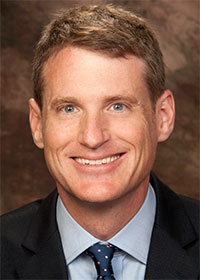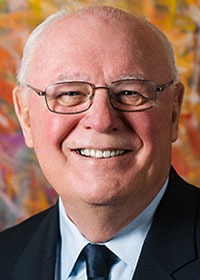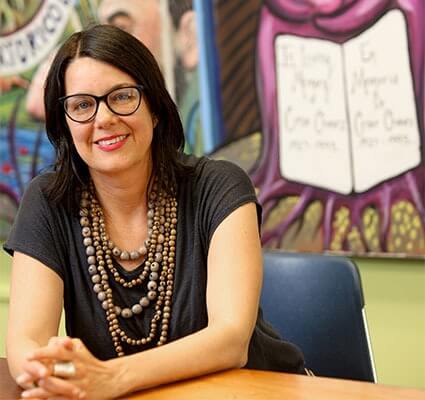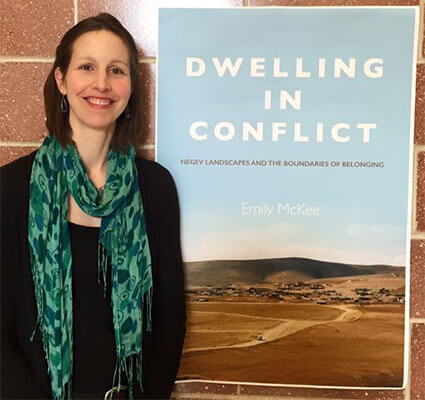Scholars from NIU and Macedonia will convene Thursday, April 19, in DeKalb to discuss local, national and international approaches to peace and transcultural communication.
“Global Problems and Community Praxis” is the second annual conference – but the first in the United States – organized on that topic by the Center for Peace and Transcultural Communication, a collaboration between NIU and the University of Tetovo.

Patrick Roberts
“We’re really excited. These are particularly timely issues these days,” said Patrick Roberts, a professor in the Department of Leadership, Educational Psychology and Foundations.
“Our key goal is to facilitate scholarly exchanges, to foster public awareness of global conflicts and to examine, ‘How can I make a difference in my local community? How does local action have global impacts?’ We want to broaden awareness of what the issues are.”
The conference, which will include four professors from Tetovo among the presenters, begins at 9 a.m. in the Barsema Alumni and Visitors Center, 231 N. Annie Glidden Road.

James Pardew
Keynote speaker James W. Pardew, a member of the Council on Foreign Relations, the U.S. ambassador to Bulgaria from 2002 to 2005 and the author of the 2017 book “Peacemakers: American Leadership and the End of Genocide in the Balkans,” will talk at 6 p.m. in the auditorium of Barsema Hall, 740 Garden Road. A reception begins at 5 p.m.
Both events are free and open to the public. Call 815-753-9359 or email proberts1@niu.edu for more information.
Roberts believes that people who attend, whether as participants or observers, will walk away with a clearer understanding of modern conflict and ways to resolve it from a “think globally and act locally” perspective.
Among the daytime presentation topics: “Does Torture Work: An Empirical Test Using Archival Data,” “The Balkans – A Matching Point of Two Controversy Theories,” “Migration as a Social Phenomenon and Refugees as a Contemporary Reality” and “The Politics of Food Diplomacy.”
Presenters also will discuss “Fleeing from Danger: Refugees’ Stories in Elementary School Classrooms,” “Religious Violence and Peacemaking: Rethinking Contemporary Conflicts,” “Between Mao and Gandhi: Social Structure and the Choice of Violent and Nonviolent Resistance,” “How Do We See Our Neighbors? Youth Inclusion, Participation and Collaboration in Moldova” and “Sport for Development and Peace.”
NIU College of Education presenters will include Teresa Fisher, Carolyn Pluim, Teresa Wasonga and Paul Wright.

Laura Ruth Johnson
Laura Ruth Johnson, a professor in the college’s Department of Educational Technology, Research and Assessment, believes the interdisciplinary nature of the presenters and topics will illuminate connections “between these different struggles, both globally and locally.
“Many times, when we have these types of conferences, they just focus on one distinct area,” she said. “This conference represents areas from all over the university. The topic is very broad – it covers a lot of ground – and allows us to explore common and divergent interests.”
Johnson’s own work in Chicago’s Humboldt Park neighborhood provides a good example.
Her research studies civic engagement, community involvement and advocacy among Latino and African-American youth, with a focus on young mothers, and sees a bridge to the University of Tetovo’s battle for justice in higher education.
Use of social media and other media, she added, is making the planet a smaller place.
“What happens in one place often resonates in other locales in terms of climate change, economic and food insecurity or fights for human rights and gender equity,” Johnson said. “The ‘Me Too’ movement has resonated internationally.”

Emily McKee
Emily McKee, a professor in the Department of Anthropology of the College of Liberal Arts and Sciences who holds a joint appointment with the Institute for the Study of the Environment, Sustainability and Energy, studies resource conflicts and environmental peacebuilding.
Her students, who are learning about access to clean water, climate change, fracking, mining and more, will participate with students of Department of Sociology Professor Laura Heideman in a roundtable discussion on conflict and peacebuilding.
McKee’s students learn about “conflicts that involve access to resources around the world. Resource conflicts and environmental peacebuilding are buzzwords that get thrown around, such as wars between two countries,” she said. “We explore some of these tropes that are not so easily pigeonholed as resource conflicts but built into other conflicts, such as social, religious and economic.”
The roundtable “is looking at our pedagogy and how we teach these courses,” she added.
During the roundtable, students will speak about their semester-long research projects on cases of resource conflict around the world and reflect on the impact that this engaged learning has had on them. “That’s relevant to them as they go on in their lives as citizens and in their careers,” McKee said. “I’m particularly excited about that.”
For his part, Roberts is excited by the potential for motivation, whether in DeKalb, Chicago or Macedonia.
“We don’t want to be a conference where people just get up and read papers,” he said. “I’m hoping to learn how understanding becomes action and the strategies people employ. None of that can succeed if there aren’t people – communities – willing to put these principles and policies into action.”
NIU and the University of Tetovo were introduced in 2014 through the work of Anthony Preston, director of Global Programs in the NIU College of Business.
The Center for Peace and Transcultural Communication was dedicated in 2015 when Acting NIU President Lisa Freeman visited the University of Tetovo. The center aims to foster better social platforms for younger generations and a better society.
A current exhibition in the College of Education’s Blackwell History of Education Museum tells the story of Tetovo through nearly 70 reproductions of photographs that depict the university’s tumultuous existence.
